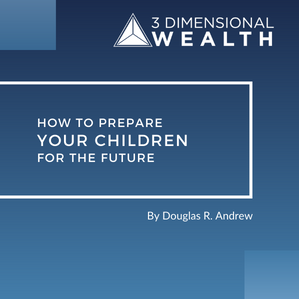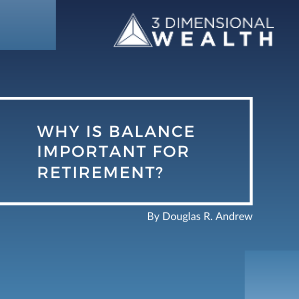Hi, Doug Andrew here.
In a recent post that I entered on the “Huffington Post” in August of 2017, it was titled “Yes, I Am Entitled.”
Well, this was really motivated because of a book that I worked many years on that I finally released at the beginning of 2017, called “Entitlement Abolition”—how to lead your family (or anybody you care about) from “me-me-me” to “we,” because together we’re better.
I was really honored that this was posted in the “Huffington Post,” and I wanted to share with you a few of the concepts that I related there.
PASSING ALONG THE SWING
There are three dimensions of what I call Authentic Wealth. It’s sort of like a three-legged stool. [Over 45 years I’ve helped] very successful people empower not just their financial wealth, but their foundational assets, their family, their values, their virtues, their heritage, their talents and unique abilities, also their experiences and their education. [This is] so that they leave behind how to fish to their kids and grandkids instead of just dumping fish in their lap.
I’ve often used the golf metaphor where if you were a golfer and you had the choice, playing in a golf tournament, of using a profession golfer like Phil Mickelson’s swing—or you could use his clubs—what would you choose?
Well, I’d rather have the swing, not the clubs.
See, I’ve noticed that a lot of financial advisors and estate planning attorneys focus on dividing up the “golf clubs” and the “trophies” among the kids and the grandkids, instead of leaving behind the swing.
A HAND UP, NOT A HAND OUT
As I noticed, a lot of these very successful people worked very hard and they would make comments like, “I don’t want my children and grandchildren to ever have to work as hard as I did. I went through the Great Depression and, boy did I work hard. I don’t want to have to have them suffer like I did.”
And then, later in life, they’re in retirement, and they come in and they go, “I just don’t know what’s going on. My kids and grandkids just don’t know how to work.” And I’d say, “Well, maybe you stole that from them.”
And they go, “What?” And I tell them, “See, you didn’t want them to have the opportunities or some of those hardships that made you who you were.”
It’s sort of like Abraham Lincoln said, “The worst thing you can do for those you love is the things that they can do for themselves.”
Robert Frost said, “Every affluent father wishes he knew how to give his sons the hardships that made him rich.” But we don’t want to see our kids suffer and, all too often, we bail them out.
We should be there giving them a hand up, but not a handout.
ACCUMULATE MORE THAN CASH … KASH
So, in the book and in this article, I talk about the difference between success and entitlement—how to capture the wisdom and knowledge, the attitudes, skills, and habits.
Knowledge, Attitude, Skills, and Habits spells the acronym KASH, which I think is more important than passing down the c-a-s-h. Then you’re leaving behind the swing, instead of just a bunch of golf clubs and trophies.
Another critical component is avoiding what I call the Scarcity Mindset. It’s an Abundance Mindset.
Because so many times I saw these children say, “When do we get our share?” And they were hovering around like vultures sometimes, waiting for their mother or father to pass away so they could get “their” $5 million, [thinking,] “Oh, I wonder what the poor people are doing today?”
They don’t even understand that that wealth ofttimes was generated by a lot of hard work. I have an acronym for “together we’re better,” but it spells TEAM—Together Everyone Achieves More.
In our family, we want to stay together, not only in this life, but we believe in a life hereafter. And we want to make sure there are no empty chairs, if you understand what I mean.
I hope that some of these concepts, not only in the article but in the book, will help you understand how to pass down the wisdom and the knowledge and empower your children and your grandchildren so that you’re leaving behind how to fish instead of just dumping the fish into their lap.
———————–
ABUNDANT LIVING HIGHLIGHTS
How to Avoid Entitling the Kids – Entitlement is a common mistake, borne from parents’ sincere desire to share their wealth and make life easier for their children. But it can be a costly mistake, with long-term, debilitating consequences. The way to avoid it is to create a balanced approach to life, focusing on all Three Dimensions of Authentic Wealth.
The Swing, Not the Clubs – As with golf, if we pass along the swing (the knowledge and skills necessary for leading an abundant life), rather than passing along clubs (the financial vehicles or money), we can help our children win at the game of life.
Skin in the Game – When we give our kids a hand up, rather than a handout, we’re inviting them to get some skin in the game, to be accountable and take part in their education, business, and life endeavors. This encourages lasting abundance rather than temporary bailouts.
Accumulate KASH – As parents, we should teach our families to accumulate KASH (Knowledge, Attitudes, Skills, and Habits). This can empower them to create abundance in all areas of life, not just the Financial Dimension (the cash).
Podcast: Play in new window | Download
Subscribe: RSS




